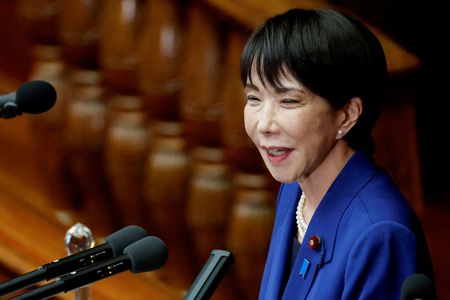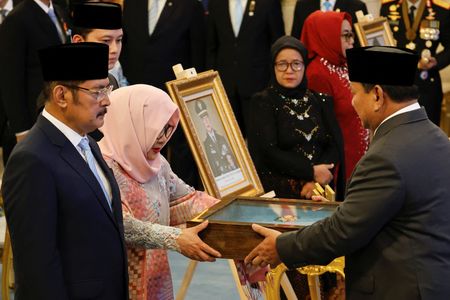By Saeed Shah and Asif Shahzad
ISLAMABAD (Reuters) -Pakistan’s powerful army chief will be given an expanded role and the remit of its Supreme Court curbed under constitutional changes passed by one of the two houses of parliament on Monday, a move opposition leaders say will undermine democracy.
Pakistan, historically coup-prone, is seeing its longest period of elected government. But in recent years, after civilians have sought to assert more authority in governance, the military has taken tighter hold of the levers of power, while not staging an outright takeover.
The bill, passed on Monday by the Senate in about three hours, unusually quickly for a constitutional change, after the opposition boycotted the debate, will now go before the lower house before it can become law.
Army chief Asim Munir, described by U.S. President Donald Trump as his “favourite Field Marshal”, would take overall command of the military – including air and naval forces – with the new position of Chief of Defence Forces under the proposed constitutional amendment. After completion of his term, he would retain his rank and have legal immunity for life.
While the military has long wielded extensive power, the reforms would give it greater constitutional backing that would not be easily rolled back. Hitherto the army chief was the equal of the air force and navy chiefs, with a chairman of the joint chiefs sitting above him, a post that would be eliminated.
The Supreme Court would no longer hear constitutional cases, instead it would be a new Federal Constitutional Court with judges appointed by the government. In recent years, the Supreme Court has, at times, blocked government policies and ousted prime ministers.
Critics say that handpicked judges would now hear the most politically sensitive cases impacting the government, with the Supreme Court dealing with civil and criminal matters.
In addition, President Asif Zardari would get immunity from prosecution for life under the reform.
“All these amendments are for governance, and the federal government’s coordination with the provinces, and to strengthen defence capability after winning a war,” Information Minister Attaullah Tarar said, referring to clashes with India in May.
The government said it was confident it had the numbers in parliament to pass the constitutional changes, which were unusually introduced over the weekend, to the Senate. A two-thirds majority is required in the two houses that make up the parliament, the Senate and National Assembly.
OPPOSITION CONDEMNS THE REFORM
The biggest opposition party, founded by jailed ex-prime minister Imran Khan, said it was not consulted. After a noisy protest, opposition parties walked out on Monday when the amendment was introduced to the Senate floor for debate.
“No one will accept this constitutional amendment if there is no consensus,” Ali Zafar, a senator from Khan’s party, said in parliament on Saturday. “You cannot force a constitution through bullets.”
Munir was promoted from General to Field Marshal after the May conflict with India. Law Minister Azam Tarar said on Saturday the rank would be given constitutional protection “because he is the hero of the whole nation”.
The military did not immediately respond to a request for comment. Security officials said the changing nature of modern war, where land troops are not necessarily playing the paramount role, requires unified command of all the armed forces.
The government says the court reforms are necessary because hearing constitutional cases takes up too much of the Supreme Court’s time, creating a case backlog.
(Reporting by Saeed Shah and Asif Shahzad; writing by Saeed Shah; editing by Mark Heinrich)









